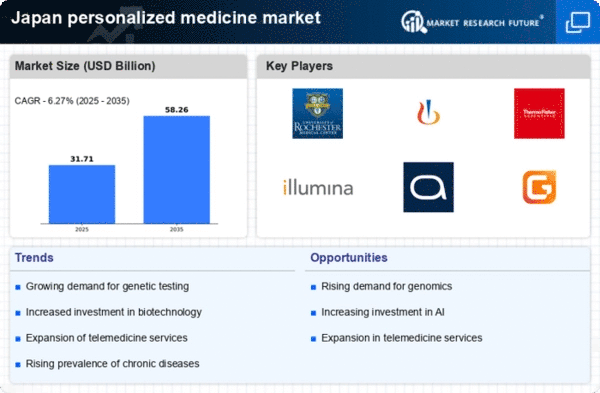Government Initiatives and Funding
Government initiatives aimed at promoting personalized medicine are significantly impacting the market in Japan. The Japanese government has launched several programs to support research and development in this field, allocating substantial funding to projects that focus on personalized healthcare solutions. For instance, recent budgets indicate an increase of 15% in funding for biotechnology research, which includes personalized medicine initiatives. These efforts are designed to enhance the country's competitiveness in the global healthcare landscape. Additionally, regulatory frameworks are being established to facilitate the approval of personalized therapies, thereby encouraging investment from both domestic and international pharmaceutical companies. This supportive environment is likely to accelerate the growth of the personalized medicine market in Japan.
Rising Demand for Targeted Therapies
The increasing prevalence of chronic diseases in Japan is driving the demand for targeted therapies within the personalized medicine market. As healthcare providers seek more effective treatment options, the focus on therapies tailored to individual genetic profiles is becoming paramount. Reports indicate that the market for targeted therapies is expected to grow at a CAGR of approximately 10% over the next five years. This growth is fueled by advancements in genomic research and the ability to identify specific biomarkers associated with various diseases. Consequently, pharmaceutical companies are investing heavily in research and development to create innovative therapies that cater to the unique needs of patients. This trend not only enhances treatment efficacy but also aligns with the broader shift towards personalized healthcare solutions in Japan.
Advancements in Diagnostic Technologies
Advancements in diagnostic technologies are playing a crucial role in the evolution of the personalized medicine market in Japan. Innovations such as next-generation sequencing (NGS) and advanced imaging techniques are enabling more accurate and timely diagnoses. These technologies facilitate the identification of specific genetic mutations and biomarkers, which are essential for developing personalized treatment plans. Recent data suggests that the market for diagnostic tools in personalized medicine is projected to grow by 12% annually over the next five years. This growth is attributed to the increasing demand for precision diagnostics that can guide therapeutic decisions. As diagnostic capabilities improve, the potential for personalized medicine to deliver effective and targeted therapies is likely to expand, further driving market growth.
Increased Awareness and Patient Engagement
There is a growing awareness among patients regarding personalized medicine, which is driving engagement and demand for tailored healthcare solutions in Japan. Educational campaigns and outreach programs have contributed to a better understanding of how personalized therapies can improve treatment outcomes. Surveys indicate that approximately 60% of patients are now more informed about their genetic profiles and the potential benefits of personalized medicine. This heightened awareness is prompting patients to seek out healthcare providers who offer personalized treatment options. As a result, healthcare institutions are adapting their services to meet this demand, thereby expanding the personalized medicine market. The emphasis on patient-centered care is likely to continue shaping the landscape of healthcare in Japan.
Integration of Genomic Data in Clinical Practice
The integration of genomic data into clinical practice is a pivotal driver for the personalized medicine market in Japan. As healthcare systems increasingly adopt genomic sequencing technologies, the ability to analyze and interpret genetic information is becoming more accessible. This integration allows for more precise diagnoses and treatment plans tailored to individual patients. According to recent statistics, the utilization of genomic data in clinical settings has risen by over 30% in the past two years. This trend is likely to continue as healthcare providers recognize the value of personalized approaches in improving patient outcomes. Furthermore, the collaboration between technology firms and healthcare institutions is enhancing the capabilities of genomic data analysis, thereby fostering innovation within the personalized medicine market.
















